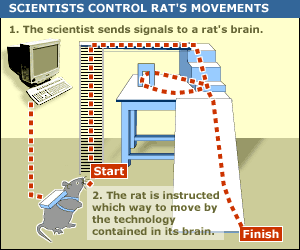Rats, roborats and ratbots (original) (raw)
Ratbot Video
(MP4, 7.3MG)Here come the ratbots
By Dr David Whitehouse BBC News Online science editor
Guided rats - so-called ratbots - controlled through implants in their brains could one day be used to search for landmines or buried victims of earthquakes, scientists say.
The extraordinary experiment involves researchers steering five rats through an obstacle course by remote control.
Writing in the journal Nature, they say the ratbots could reach places inaccessible to humans or machines.
The researchers are led by Dr Sanjiv Talwar of the State University of New York.
Commands and rewards
Electrodes were implanted into areas of the rat brain responsible for sensing reward as well as those that process signals from their whiskers.
The commands and rewards were transmitted by radio from a laptop computer to a backpack receiver strapped to each rat.
The scientists were able to make the rats run, turn, jump and climb where they wanted from distances of up to 500 metres (1640 feet) away.
The ratbots negotiated an obstacle course which involved climbing a vertical ladder, running along a narrow ledge, hopping down a flight of steps, squeezing through a hoop and descending a steep ramp.
The scientists say, "Our rats were easily guided through pipes and across elevated runways and ledges, and could be instructed to climb, or jump from, any surface that offered sufficient purchase.
"We were also able to guide rats in systematically exploring large, collapsed piles of concrete rubble and to direct them through environments that they would normally avoid, such as brightly lit, open arenas."
A "turn left" signal was interpreted by the rat's brain as a "touch" on its left whiskers. If the rat correctly followed the cue and turned left, its reward-centre was stimulated, filling the rat with a feeling of well-being.
Dr Talwar says, "This is an animal with 200 million years of evolution behind it. Rats have native intelligence which is a lot better than artificial intelligence."
Ethical problems
"It is a hard problem simply trying to make a robot move properly over unpredictable terrain. It would be a simple matter to train rescue rats to recognise and home in on the smell of a human trapped under rubble."
Dr Talwar acknowledged there might be ethical objections to such ideas, even if they could save human lives.
"Our animals were completely happy and treated well and in no sense was there any cruelty involved," he says.
"Nonetheless, the idea is sort of creepy. I do not know what the answer is to that."
Refs and further reading
HOME Insbots Ratbots Hybrots Robosnails Roboroaches More Ratbots Orgasmatrons Roborat Ethics Hybrots: MEART The First Roborat Hypermotivation The New Roborats The Good Drug Guide Unnatural Pleasures? Designer Aphrodisiacs Rats, roborats and ratbots Electrical Brain Stimulation Critique of Brave New World The Orgasm Command-Center Roborat Video (mp4: 3.133Mb) The Transcranial Magnetic Stimulator Cyborgs, Transhumans and Neuroelectronics Wireheads and Wireheading in Science Fiction Pleasure Evoked by Electrical Stimulation of the Brain
dave@bltc.com

